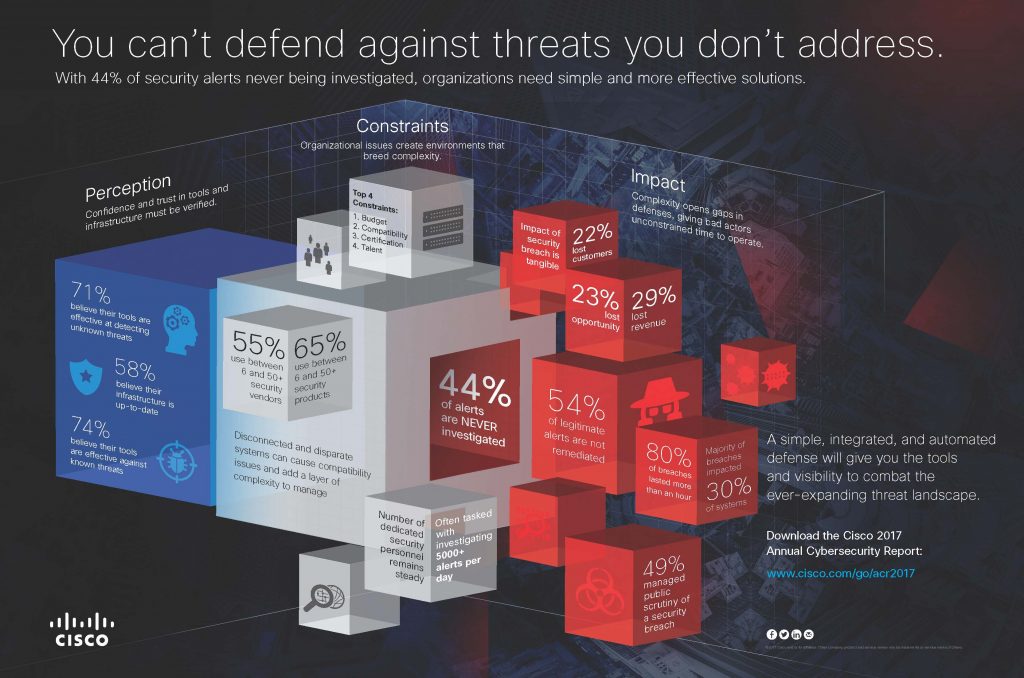Network security , do you know what it is? Cisco network security is a process that is set up to protect the usability and integrity of one’s network and data. Network security is a process that entails both software and hardware platforms. The right kind of network security allows the user or administrator to manage access to the network. So how does it work? The process used the combination of various layers of defense at both within the network and at the edge of the network. Each layer of security is designed to provide various controls and checks. The layers allow only authorized used to gain access to the network resources and keep out malicious and carrying out an attack.

Cisco and Network Security
Cisco is a well-known technology firm that mainly operates in the networking equipment industry. They provide networking hardware and high technology services. Network security is one of the technology services offered by Cisco. Cisco offered network security for both individuals and enterprises. Network security is important since it can do a lot for you. Cisco can be able to allow a firm or enterprise do the following:
Reduce risk – The right network security enables one to turn their entire system into a secure one with a solution that is designed to provide various layers of protection.
Gain Deep Visibility – Users will be able to utilize real-time data that is secure and also have real-time visibility and intelligence to sense any malicious or suspicious intrusions.
Lower Complexity – with Cisco one will be able to choose from different forms of security according to their system or preference. One can choose from dedicated, end-to-end or cloud-managed options.
Protect against threats – The main aim of using Cisco network security services and policies that will take action to protect one’s system from an unknown type of threats.
Functions of Network Security
Some of the various types and functions of network security include the following:
Access Control
In any network, not every should be able to have access to the system. To be able to prevent any attacks, one will need to keep out any hackers and be able to identify various users and certain devices. Once this is done, one will be able to enforce the right kind of security policies. It allows one to block certain noncompliant endpoint devices or give it limited access. This process is referred to as network access control (NAC). This is important when it comes to DHCP so as to enhance network security. DHCP relay is a potential entry point for security threats. If there is no authentication or authorization between DHCP server and client, the server cannot know whether the request is legitimate. Without network security, it means rogue clients and servers can be able to create various problems within the network, such as the installation of unauthorized, exposure of sensitive information and hijacking of DNS server. It is therefore very important to have DHCP access control in the network.
Antivirus and Antimalware Software
Malicious software (malware in short) include spyware, Trojans, viruses, worms, and ransomware. In some cases, malware can lie within a network for some time before it affects it. The right kind of antimalware applications is designed to scan for malicious software each time on entry, and also be able to track the files after entry so as to look for any anomalies or to remove malware.
Application Security
Any application running on the network or system needs to be protected; it does not matter whether it is bought or designed by the IT stay. Regrettably, apps may come with vulnerabilities, which are ideal for hackers to use to gain entrance into the network. Application security entails software, hardware, and processes so as to reduce the vulnerability.
Firewalls
Firewalls within network security are designed to create a trusted internal network with a barrier used to protect in from untrusted outside networks, such as the internet. It is designed with rules to allow or block certain traffic. Firewalls can be software, hardware or both. Cisco has the UTM (unified threat management) and threat-focused next-generation firewalls.
Specifications of Network Security
Behavioral Analytics
tools within a system will automatically detect activities within the system that are abnormal. Once the tools have identified the abnormal activity, the IT staff can then better identify the indicator and check whether it poses a potential problem to the network system.
VPN
Virtual Private Networks (VPNs) are ideal since they encrypt the connection from an endpoint to a network, usually over the internet. VPNs will usually use IPsec or Secure Sockets Layer to authenticate the communication between devices and networks.
Advanced threat protection
This is a form of security solution that is used to protect the system from sophisticated malware or type of hacking that is targeting specific sensitive data. ATP can be available in the form of software or as managed services. ATP solutions can be quite different; most consist of a combination of the network device, endpoint agents, malware protection systems and email gateways.
Benefits of Network Security
The advancement of technology and digitization of various platforms have changed how things are today, including how we live, work, learn and play. Any organization that wants to deliver services to clients and employees must make sure to protect their network. Network security helps protect information from attacks. At the end of the day, it can prevent reputation. Cisco has played a huge role in changes in technology and its use. A secure network from Cisco enables one to easily add new users and applications to the system when needs. As an enterprise one will be able to use the inbuilt flexibility to keep up with the technological change and reach quickly to any changes. Network security is quite important and prevents the collapsing of any system or network.


